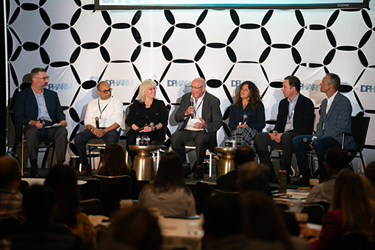DPHARM 2024 Highlights ClinOps Innovations That Address Cost, Complexity, & Capabilities
By Danny McCarthy, DPHARM Multimedia Editor

At the 14th annual DPHARM opening academic keynote, Kenneth Getz, MBA, Tufts Center for the Study of Drug Development, presented research from CSDD on how to measure and convey return on investment, both in the short and long term, which could encourage the medicine-development industry to adopt innovation. His presentation also examined the ROI of DCTs and results from the PACT (Partnership for Advancing Clinical Trials) consortium on actual DCT use in recent trials.
The keynote kicked off two days focused on real and impactful changes (e.g., AI/automation, simplifying trials where possible) designed to address the complexity — and cost — of today’s clinical trials.
Attendees heard from senior clinical operations executives, technologists, and KOLs on how and where to innovate in a resource-constrained environment, ultimately driving greater inclusivity and value for patients.
Patient advocate keynote Sarah Zenner-Dolan, in a conversation with Parexel CEO Peyton Howell, MHA, used her perspective as a former pharma executive and a clinical trial participant to discuss her diagnosis journey, trial experience, and thoughts for ClinOps professionals.
Faisal M. Khan, Ph.D., Novo Nordisk, brought DPHARM up-to-speed on the reality of AI and GenAI in drug development, and provided the audience with the tools and understanding of how to use AI to medicine development’s benefit.
High-level panel discussions focused on efficiency in resource constraints. First, Takeda, Parexel, Regeneron, Merck & Co, Greenphire, and LLR Partners tackled aligning innovations to solve the big challenges — from implementing automation to meeting complexity where it’s at. Then, CSL Behring, Amgen, Boehringer Ingelheim, and J&J Innovative Medicine focused on shifting operating models to translate complex protocols into more efficient trials. Finally, Takeda, Merck & Co, Bayer, and Novartis discussed developing an ecosystem-approach for problem-solving solutions and simplifying for speed while maintaining quality and safety.
Outside-industry keynotes brought fresh perspectives: Ambassador “Sully” Sullenberger, U.S. Airways Flight 1549 Captain, detailed the focus he had to demonstrate, balancing risk against time, to achieve the water-landing “Miracle on the Hudson,” giving lessons for pharma on making hard decisions when it matters the most. Award-winning guitar virtuoso Mike Rayburn challenged the audience to create change with a “What If” mindset, viewing the complexity and tight resources of the current market as a jumping off point, and not an impediment.
Technologists and service providers gave insight into the work they are doing for patient-centric clinical trial services, DCTs, mobile and digital technology, incorporating EHR, RWE, and eCOA, and pushing the industry forward into the future of clinical trials.
Sponsors identified how they were advancing clinical trials by enhancing protocol designs, optimizing business processes, and delivering value through strategic collaborations. They also discussed the importance of pushing forward large-scale innovation coupled with organizational ambidexterity and workforce diversity.
DPHARM Idol Disrupt returned with a new slate of highly vetted finalists who presented how they were developing a disruptive technology/service that could be a changing force for clinical trials. The winner, Power, impressed the judges with their simple and user-friendly platform that helped patients navigate clinical trial options, scanned patient-uploaded medical documents for inclusion/exclusion criteria to match patients to potential trials, and let patients browse nearby clinical trial sites.
The event convened almost 1,000 professionals across the clinical trial landscape, focused on making clinical trials better, faster, and more efficient, with the goal of delivering life-changing medicine and technologies to patients sooner.
